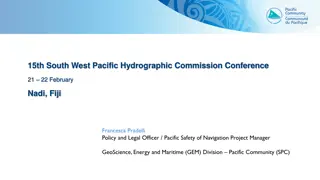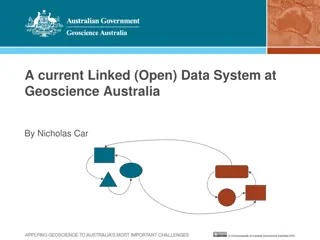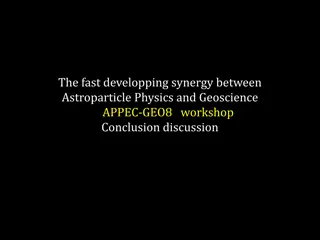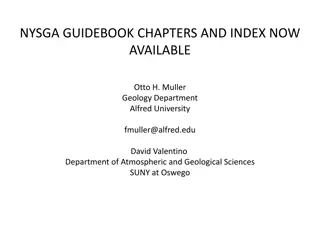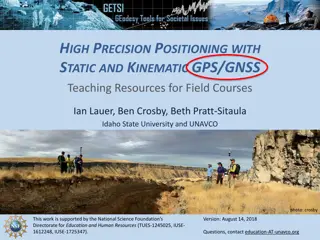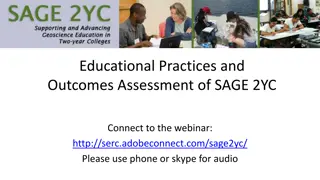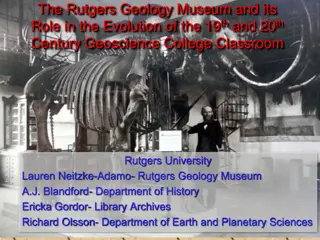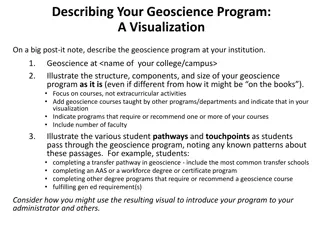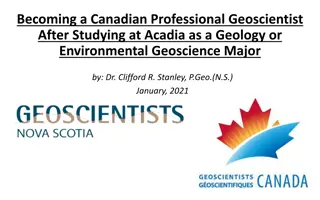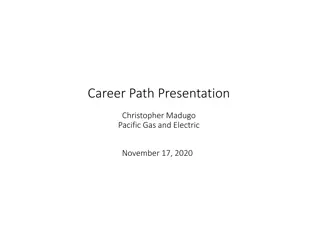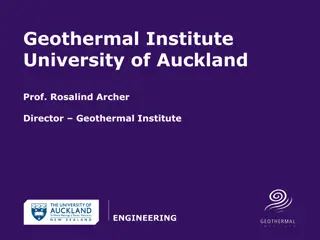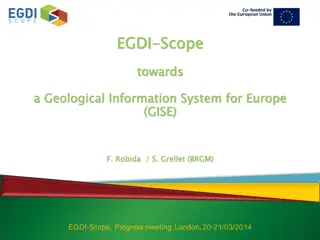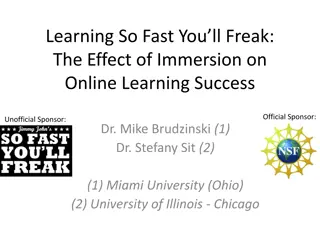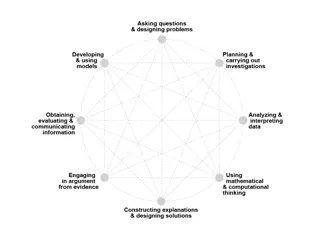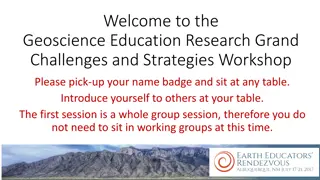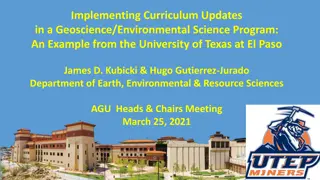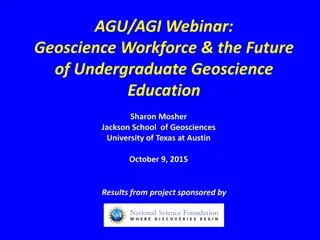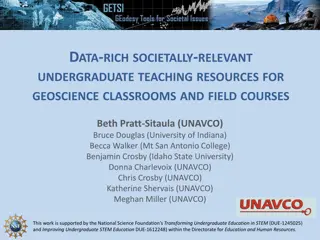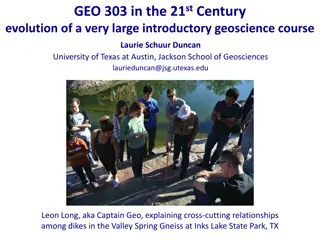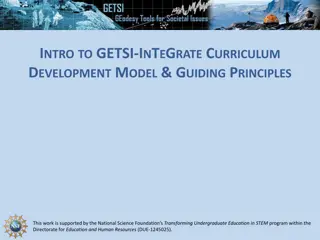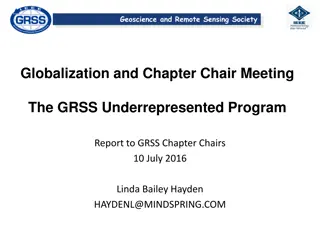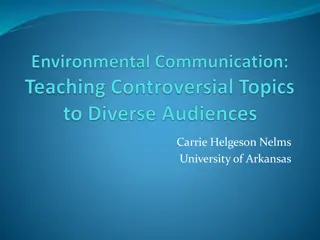Enhancing Sustainable Development in the South-West Pacific Through Geoscience, Energy, and Maritime Initiatives
The 15th South West Pacific Hydrographic Commission Conference held in Nadi, Fiji focused on advancing policies for safe navigation and project management in the Pacific. The GeoScience, Energy, and Maritime Division of the Pacific Community (SPC) highlighted its mandates and strategic priorities, p
0 views • 10 slides
Introduction to Linked Data in Geoscience Australia
Linked Data is a publishing paradigm that elevates both web pages and data to first-class citizens of the Web, enabling a global data space evolution. This concept, as explored in Geoscience Australia, involves the utilization of Semantic Web standards to promote common data formats and exchange pro
1 views • 23 slides
Enhancing the Synergy Between Astroparticle Physics and Geoscience: APPEC-GEO8 Workshop Insights
The workshop discussion highlighted the growing synergy between Astroparticle Physics and Geoscience, emphasizing the importance of precise understanding of the Geosphere for studying the Cosmos. Topics included Neutrino tomography, deep life exploration, optical fibers coupled with sensors, seismic
1 views • 4 slides
Exploring Geological Insights: NYSGA Guidebook Chapters and Index
Discover the wealth of information available in the NYSGA Guidebook, with chapters on evolving thoughts in geology, field trip guidebook instructions, and fascinating insights into rocks and fossils. Explore the collaboration between Alfred University and SUNY at Oswego in advancing geoscience educa
0 views • 24 slides
Enhancing Geoscience Field Courses with High-Precision GNSS Teaching Resources
Explore the benefits and challenges of integrating high-precision GNSS tools in field courses for geoscience students. Discover how students can develop valuable skills, apply GNSS surveys to societal issues, and tackle geologic research questions. Uncover strategies to overcome barriers and motivat
0 views • 8 slides
Educational Practices and Outcomes Assessment of SAGE 2YC Webinar
Explore the Educational Practices and Outcomes Assessment of SAGE 2YC through the November 2016 webinar featuring experts like Heather Macdonald, Debra Bragg, and Pamela Eddy. The webinar covers the project goals, data collection plan, educational practices inventory, outcomes assessment, and the SA
0 views • 22 slides
Evolution of Geoscience Education at Rutgers University
The Rutgers Geology Museum played a significant role in the development of geoscience education in the 19th and 20th centuries at Rutgers University. From the rise of geology in the United States to the establishment of geology courses at the university, key figures like George H. Cook and A.H. Ches
0 views • 12 slides
Geoscience Program Overview at Highline College
Geoscience program at Highline College offers a Geology pathway with various courses and options for students to transfer to 4-year universities in Washington. The program includes multiple touchpoints and pathways, with common courses like Mount St. Helens and Seattle Fault. Faculty consists of ten
0 views • 4 slides
Path to Becoming a Professional Geoscientist in Nova Scotia
Discover the essential steps to become a Professional Geoscientist in Nova Scotia after studying Geology or Environmental Geoscience at Acadia. Understand the requirements, knowledge, and experience needed to excel in the field. Explore the vital role of Professional Geoscientists in various industr
0 views • 27 slides
Career Path Presentation of Christopher Madugo at Pacific Gas and Electric
Christopher Madugo's career path at Pacific Gas and Electric involves a strong focus on seismic hazard assessment for utility infrastructure. With expertise in fault characterization and geohazard sensitivity, he has contributed significantly to projects like the Panama Canal Expansion. In-house at
0 views • 12 slides
Geothermal Institute at University of Auckland - Advancing Renewable Energy Solutions
The Geothermal Institute at University of Auckland, led by Prof. Rosalind Archer, specializes in geoscience, reservoir engineering, and renewable energy technologies. Their research projects range from fundamental geoscience to societal implications in energy markets. The institute offers educationa
0 views • 13 slides
Geological Information System for Europe: EGDI-Scope Progress Meeting 2014
Toward a Geological Information System for Europe (GISE), the EGDI-Scope project aims to support European Commission policies on mining wastes, Water Framework Directive (WFD), INSPIRE, biodiversity, water, air, and geology. By organizing an information system instead of a data infrastructure, it pr
0 views • 11 slides
Immersion Education for Online Learning Success
Immersion education, typically used in fields like geology, has shown to enhance conceptual understanding. Can online environments be leveraged for immersion education? This study explores the impact of immersion education on student learning outcomes in an online Introduction to Environmental Geolo
0 views • 16 slides
Practices in Data Analysis and Prediction
Harness the power of data analysis and visualization to understand relationships between variables, predict phenomena, and communicate findings effectively. Explore using models and systems to make claims, generate investigable questions, and analyze geoscience data for Earth's systems and climate p
0 views • 9 slides
Geoscience Education Research Workshop: Addressing Grand Challenges
Geoscience Education Research Workshop funded by the National Science Foundation aims to set ambitious goals for geoscience education research to enhance undergraduate teaching and learning. Participants will identify key themes, prioritize grand challenges, and recommend strategies for rapid achiev
0 views • 13 slides
Implementing Curriculum Updates in Geoscience Program at University of Texas
This example from the University of Texas at El Paso showcases a successful implementation of curriculum updates in a Geoscience/Environmental Science program. The university emphasized educating students about current career opportunities, equipping them with necessary skills, fostering networking
0 views • 14 slides
Insights into the Future of Geoscience Workforce and Education
An exploration of the future landscape of geoscience workforce and undergraduate education through findings from the 2014 Summit and subsequent workshops. Emphasis on the need for multidisciplinary approaches, evolving skill sets, and integrating diverse datasets to meet the changing demands of the
0 views • 28 slides
Enhancing Geoscience Education with Data-Rich, Societally Relevant Resources
Explore a collaborative project focused on developing teaching materials for geoscience classrooms and field courses. Supported by NSF grants, the project aims to improve undergraduate STEM education by emphasizing geodesy data and quantitative skills applied to societal issues like climate change a
0 views • 19 slides
Evolution of GEO 303: A Large Geoscience Course in the 21st Century
Evolution and success of GEO 303, a large introductory geoscience course at the University of Texas at Austin. The course blends physical and historical geology, challenges students' pre-conceived notions, and encourages them to think like geologists. Team teaching, innovative instructional methods,
0 views • 8 slides
Enhancing Geoscience Literacy and Workforce Preparedness through InTeGrate Curriculum Development
A comprehensive initiative supported by National Science Foundation aimed at improving geoscience literacy, integrating societal issues into undergraduate curriculum, and fostering interdisciplinary teaching. Through collaborative efforts and explicit focus on transformation of higher education, InT
0 views • 27 slides
Geoscience and Remote Sensing Society Underrepresented Program Report
Geoscience and Remote Sensing Society's report discusses initiatives to address underrepresentation in the field, focusing on globalization, local/ host country underrepresentation, and objectives for developing a comprehensive plan for the future. The report outlines strategies, committee members,
0 views • 13 slides
Effective Communication for Diverse Audiences in Geoscience and Anthropology
Exploring the Elaboration Likelihood Model of Persuasion by Petty and Cacioppo in the context of communication strategies for addressing sea-level rise, displacement, and conflict. Emphasizing the importance of considering diverse audience profiles and utilizing central processing methods to engage
0 views • 10 slides
Transforming Geoscience Education with Remote Electron Microscopy
Expanding the use of online remote electron microscopy to enhance undergraduate geoscience education at Valencia College through a project focused on evaluating sands remotely using an operated scanning electron microscope. Students collect and analyze various sands using different tools and techniq
0 views • 10 slides
